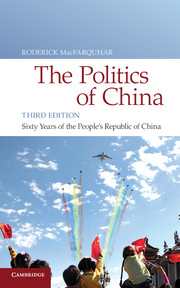Book contents
- Frontmatter
- Contents
- Tables and Maps
- Preface
- Abbreviations
- Introduction
- Chapter 1 The establishment and consolidation of the new regime, 1949–1957
- Chapter 2 The great leap forward and the split in the Yan'an leadership 1958–1965
- Chapter 3 The Chinese State in crisis, 1966–1969
- Chapter 4 The succession to Mao and the end of Maoism, 1969–1982
- Chapter 5 The road to Tiananmen: Chinese politics in the 1980s
- Chapter 6 Reaction, Resurgence, and Succession: Chinese Politics since Tiananmen
- Chapter 7 Dilemmas of globalization and governance
- Appendix Leaders and Meetings
- References
- Index
- References
Chapter 3 - The Chinese State in crisis, 1966–1969
Published online by Cambridge University Press: 05 June 2012
- Frontmatter
- Contents
- Tables and Maps
- Preface
- Abbreviations
- Introduction
- Chapter 1 The establishment and consolidation of the new regime, 1949–1957
- Chapter 2 The great leap forward and the split in the Yan'an leadership 1958–1965
- Chapter 3 The Chinese State in crisis, 1966–1969
- Chapter 4 The succession to Mao and the end of Maoism, 1969–1982
- Chapter 5 The road to Tiananmen: Chinese politics in the 1980s
- Chapter 6 Reaction, Resurgence, and Succession: Chinese Politics since Tiananmen
- Chapter 7 Dilemmas of globalization and governance
- Appendix Leaders and Meetings
- References
- Index
- References
Summary
The Great Proletarian Cultural Revolution, which by official Chinese reckoning lasted from the beginning of 1966 to the death of Mao Zedong some ten years later, was one of the most extraordinary events of this century. The images of the Cultural Revolution remain vivid: the young Red Guards, in military uniform, filling the vast Tiananmen Square in Beijing, many weeping in rapture at the sight of their Great Helmsman standing atop the Gate of Heavenly Peace; veteran Communist officials, wearing dunce caps and placards defiling them as “monsters” and “freaks,” herded in the backs of open-bed trucks, and driven through the streets of major cities by youth only one-third their age; the wall posters, often many sheets of newsprint in size, filled with vitriolic condemnations of the “revisionist” or “counterrevolutionary” acts of senior leaders. The little red book carried by the Red Guards – a plastic-bound volume containing selected quotations from Chairman Mao – remains a symbol of the revolt of the young against adult authority.
- Type
- Chapter
- Information
- The Politics of ChinaSixty Years of The People's Republic of China, pp. 147 - 245Publisher: Cambridge University PressPrint publication year: 2011
References
- 1
- Cited by

